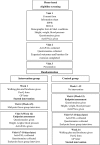Physical Activity Intervention for Loneliness (PAIL) in community-dwelling older adults: protocol for a feasibility study
- PMID: 30598833
- PMCID: PMC6299531
- DOI: 10.1186/s40814-018-0379-0
Physical Activity Intervention for Loneliness (PAIL) in community-dwelling older adults: protocol for a feasibility study
Abstract
Background: Low-quality social relationships in older adults are strongly associated with feelings of loneliness. Physical activity interventions could reduce loneliness and improve psychological well-being, among other health benefits. The aim of this study is to examine the feasibility of a Physical Activity Intervention for Loneliness (PAIL) in community-dwelling older adults at risk for loneliness.
Methods/design: This feasibility study is a two-arm randomised controlled trial (RCT) with a wait-list control group using a mixed-methods research design. The primary aim of the feasibility study is to estimate recruitment, retention and adherence rates; the appropriateness of the intervention design and its practicality; the acceptability of the intervention by participants; and the set of instruments and measures and primary outcome measures to inform a future large-scale randomised trial. After eligibility screening, randomisation will be conducted using computer-based random sequence generation. Baseline and post-intervention assessments for intervention and control groups will include height, weight, body mass index, resting blood pressure, physical activity using accelerometry, loneliness, social support, social networks, anxiety and depression, self-efficacy for exercise, satisfaction with social contacts, and expected outcomes and barriers for exercise using questionnaires. Focus groups will be conducted at the mid-point and post-intervention period using a phenomenological approach to analyse the participants' experiences of taking part in PAIL.
Discussion: This trial will provide important information regarding the feasibility of PAIL in community-dwelling older adults at risk for loneliness using a mixed-methods approach combining quantitative and qualitative research methods.
Trial registration: Clinicaltrials.gov NCT03458793.
Keywords: Feasibility study; Loneliness; Older adults; Physical activity; Randomised controlled trial.
Conflict of interest statement
AW is a Professor in Behavioural Medicine. JT is a Professor of Public Health Nutrition and Exercise. CG is a Reader in Musculoskeletal Ageing and Health, all at the School of Sport, Exercise & Rehabilitation Sciences, University of Birmingham, UK.Not applicable.The authors declare that they have no competing interests.Springer Nature remains neutral with regard to jurisdictional claims in published maps and institutional affiliations.
Similar articles
-
Physical Activity Intervention for Loneliness (PAIL) in community-dwelling older adults: a randomised feasibility study.Pilot Feasibility Stud. 2020 May 23;6:73. doi: 10.1186/s40814-020-00587-0. eCollection 2020. Pilot Feasibility Stud. 2020. PMID: 32489675 Free PMC article.
-
The Community Navigator Study: a feasibility randomised controlled trial of an intervention to increase community connections and reduce loneliness for people with complex anxiety or depression.Trials. 2017 Oct 23;18(1):493. doi: 10.1186/s13063-017-2226-7. Trials. 2017. PMID: 29061185 Free PMC article. Clinical Trial.
-
Targeting functional fitness, hearing and health-related quality of life in older adults with hearing loss: Walk, Talk 'n' Listen, study protocol for a pilot randomized controlled trial.Trials. 2017 Jan 28;18(1):47. doi: 10.1186/s13063-017-1792-z. Trials. 2017. PMID: 28129779 Free PMC article. Clinical Trial.
-
Folic acid supplementation and malaria susceptibility and severity among people taking antifolate antimalarial drugs in endemic areas.Cochrane Database Syst Rev. 2022 Feb 1;2(2022):CD014217. doi: 10.1002/14651858.CD014217. Cochrane Database Syst Rev. 2022. PMID: 36321557 Free PMC article.
-
Digital interventions for hypertension and asthma to support patient self-management in primary care: the DIPSS research programme including two RCTs [Internet].Southampton (UK): National Institute for Health and Care Research; 2022 Dec. Southampton (UK): National Institute for Health and Care Research; 2022 Dec. PMID: 36538606 Free Books & Documents. Review.
Cited by
-
The Long-Term Public Health Impact of Social Distancing on Brain Health: Topical Review.Int J Environ Res Public Health. 2021 Jul 8;18(14):7307. doi: 10.3390/ijerph18147307. Int J Environ Res Public Health. 2021. PMID: 34299756 Free PMC article. Review.
-
How is the COVID-19 lockdown impacting the mental health of parents of school-age children in the UK? A cross-sectional online survey.BMJ Open. 2021 May 11;11(5):e043397. doi: 10.1136/bmjopen-2020-043397. BMJ Open. 2021. PMID: 33980516 Free PMC article.
-
The Importance of Social Support, Positive Identity, and Resilience in the Successful Aging of Older Sexual Minority Men.Geriatrics (Basel). 2021 Oct 10;6(4):98. doi: 10.3390/geriatrics6040098. Geriatrics (Basel). 2021. PMID: 34698189 Free PMC article.
-
An Intervention to Connect Patients With Psychosis and Volunteers via Smartphone (the Phone Pal): Development Study.JMIR Form Res. 2022 Jun 2;6(6):e35086. doi: 10.2196/35086. JMIR Form Res. 2022. PMID: 35653171 Free PMC article.
-
The Association between Loneliness and Health Related Quality of Life (HR-QoL) among Community-Dwelling Older Citizens.Int J Environ Res Public Health. 2020 Jan 17;17(2):600. doi: 10.3390/ijerph17020600. Int J Environ Res Public Health. 2020. PMID: 31963427 Free PMC article.
References
-
- Office for National Statistics. Inequalities in social capital by age and sex, July 2015 2015 [http://webarchive.nationalarchives.gov.uk/20160105160709/http://www.ons....].
Associated data
Grants and funding
LinkOut - more resources
Full Text Sources
Medical


